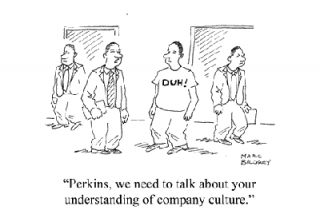How often do you hear: “that’s just” or (more likely!) “that’s not the way we do things round here”? Here’s a question for you: how did you come up with the ‘way you do things round here’ – your business ‘culture’? Chance? Habit? Nurture? Nature? Whatever your answer, the chances are that ‘the way we do things round here’ was very rarely designed. That’s how businesses develop. They start up, and it’s all hands to the pump. The drive is to get business at all costs and to survive.
This drives certain kinds of behaviour: people work long hours, everybody pitches in and working practices just evolve. There’s no time for considered conversations about what to do and how to do it, or for streamlining and improving processes. Then there comes a point in the life of your business when you are employing more people than at any time in your its growth so far. You are past the ‘all-hands-to-the-pump’ start-up stage. Suddenly your business has a ‘life of its own’, and can’t be managed by you trying to ‘hold all the strings’. You find yourself saying:
- Why doesn’t anybody do anything without my say-so?
- How can I get my people to do what I need them to do?
- How am I ever going to sell the business – I’m too central to it?
- Why are we always juggling?
- How can I find the time to sort it all out?
Becoming a ‘Grown-Up’ Company
If you are looking to develop your business into a truly streamlined unit – a ‘proper company’, professionally led and managed, you are faced with a set of decisions to make which will determine the future style and culture of your company. You need to focus on:
- Clarifying people’s roles – so you don’t all try to do everything, and, conversely, things don’t ‘fall through the gaps’.
- Agreeing explicit values and other behavioural standards – so the business develops a clear personality, or brand, that reflects how you want it to project itself, and the right people feel safe and comfortable working there.
- Sorting out the processes – how work gets done, so that cost is reduced, time is not wasted, and people don’t get frustrated and stressed.
Role Clarity?
Most people, asked “what do you do?”, reply with a job role or title, or a list of the activities they carry out day to day. What you never hear is a short complete list of the results they are accountable for producing. This is a far better way of defining roles and fosters a culture of results, satisfaction and recognition. And because it’s short and memorable, people have, and can retain, a complete mental ‘map’ of their own role, that of each of their colleagues and that of the team as a whole.
If you grabbed one of these people in the lift and asked, “What do you do?”, they would say something like, “I’m accountable for producing: profitable new business, a motivated high-performance team, an efficient, best-practice business operation, and satisfied & delighted clients”. They would know exactly how each of these areas was measured and the exact progress of their performance against each measure without having to look it up!
What’s the Best Way of Doing This?
Not the way you’d expect. Don’t burn the midnight oil and redesign the way things work all by yourself! This is your chance not to be the ‘spider at the centre of the web’, and to signal a new era to your staff. Engage the team in clarifying their roles – with each other, in a facilitated event. That way they learn on the job to negotiate solutions, agree behavioural norms and redesign processes that evolved to meet the needs of a much ‘younger’ business. All sorts of ‘baggage’ floats to the surface and can be resolved in the clear light of day. And all sorts of little issues and problems with everyday work will come up, to be sorted out right there and then.
One of our clients said, “I was surprised at the ‘baggage’ that came up and the degree to which it was getting in the way (but) the way the business came together following the event was much better than it would have been without it”.
This way, as your business grows, you end up with a way of doing things – ‘just the way we do things round here’ – that you designed and that didn’t just happen by chance!
- How do you do things in your business – and how did this way of doing things evolve?
- How useful would it be to step back and ‘redesign’ some of the ways you do things?
- What’s stopping you?
[callout title=”Let us help you redesign your business culture” button=”Here’s how” link=”/services/organisation-development/” buttoncolor=”white, yellow, orange, red, blue, green, gray, black, alternative-1, alternative-2, alternative-3″ target=”_blank or _self”]Create an organisation to be proud of[/callout]
